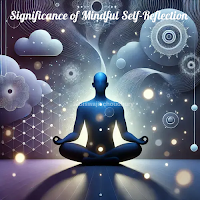The Impact of Mindful Self-Reflection: Enhancing Emotional Regulation, Self-Awareness, and Personal Growth
The Impact of Mindful Self-Reflection: Enhancing Emotional Regulation, Self-Awareness, and Personal Growth
Mindful self-reflection is an intentional practice where individuals analyze their thoughts, emotions, and behaviors to achieve greater self-awareness. In a fast-paced world filled with distractions, this practice has become crucial for emotional regulation, decision-making, and personal growth. This blog explores its significance and provides actionable steps to incorporate mindful reflection into your life.Objective
The primary objective of this blog is to provide insights into how mindful self-reflection can enhance emotional regulation, increase self-awareness, and foster personal growth. By exploring methods and tools, the blog helps readers develop a reflective practice that contributes to a balanced, conscious lifestyle.
Method
Mindful self-reflection can be practiced using techniques like journaling, guided meditation, and personal assessment. This blog focuses on qualitative methods including case studies, expert opinions, and personal stories from mindfulness practitioners.
Process of Mindful Self-Reflection
To begin practicing mindful self-reflection, follow these steps:
- Step 1: Set Time for Reflection - Dedicate a few minutes each day to reflect on your thoughts and emotions.
- Step 2: Keep a Journal - Document your reflections in a journal to track patterns in your behavior and feelings.
- Step 3: Practice Meditation - Engage in mindful meditation to observe your thoughts non-judgmentally.
- Step 4: Evaluate Your Emotions - Analyze how certain thoughts trigger emotional reactions.
Significance
Mindful self-reflection is crucial for emotional regulation and personal development. By regularly engaging in this practice, individuals can gain control over impulsive reactions, make better decisions, and achieve a sense of inner peace.
Useful Data & Statistics
- According to a 2022 report, mindfulness practices like self-reflection have been shown to reduce stress levels by 30% in individuals practicing regularly for over a year.
- Recent studies show that individuals who engage in mindful reflection have 25% higher emotional intelligence scores compared to those who do not.
Example of Mindful Self-Reflection in Day-to-Day Life
Consider the case of Sarah, a marketing professional, who regularly practices mindful self-reflection. Each evening, she reflects on her daily experiences, which helps her understand her stress triggers and emotional responses. Over time, Sarah developed stronger emotional resilience and improved her work performance significantly.
Outcome
Through mindful self-reflection, individuals can achieve improved emotional regulation, enhanced self-awareness, and sustained personal growth. It leads to better decision-making, stronger relationships, and a more fulfilled life.
Sub-Topics to Explore
- The Role of Mindfulness in Stress Management
- How Self-Reflection Impacts Emotional Intelligence
- Mindfulness and Workplace Productivity
Most Popular Questions About Mindful Self-Reflection
- What is the difference between mindfulness and self-reflection?
- How can self-reflection improve emotional regulation?
- What are the best ways to practice mindful reflection daily?
References
- The Science Behind Mindfulness
- American Psychological Association: Mindfulness Research
- Mindful.org: Benefits of Mindfulness
useful links
Institution and Organization Links
- Mindfulness Australia - Offers mindfulness training and resources.
- UCSD Center for Mindfulness - Provides mindfulness programs and scientific research.
Share this Article:
This is sample content to enhance using AI analysis.
Explore More:
Join the Conversation!
Leave a comment below, share this article, and explore more content on mindful self-reflection and personal growth.















Comments
Post a Comment